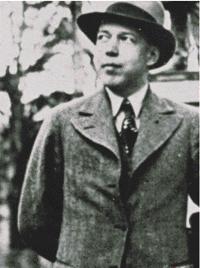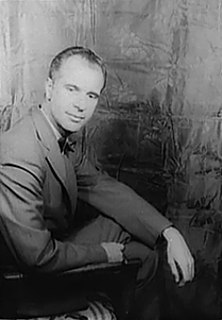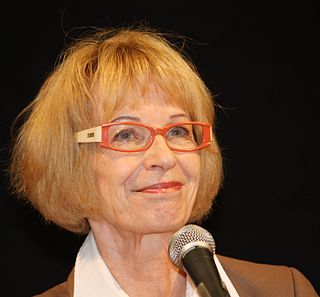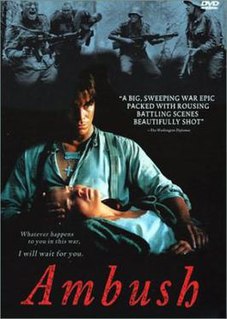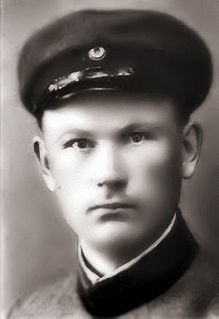
Onni Palaste, born Onni Bovellan (27 December 1917 - 1 July 2009) was a Finnish Winter War veteran and writer.

The Winter War was a military conflict between the Soviet Union (USSR) and Finland. It began with a Soviet invasion of Finland on 30 November 1939, three months after the outbreak of World War II, and ended three and a half months later with the Moscow Peace Treaty on 13 March 1940. The League of Nations deemed the attack illegal and expelled the Soviet Union from the organisation.
Contents
Onni Bovellan was born in Kiuruvesi, Finland on 27 December 1917 to parents Joona Bovellan and Olga Miina Kärkkäinen. He was a frail child and was not originally expected to live long. However, he survived and became healthy. After finishing school, Bovellan went to work in a sawmill.

Kiuruvesi is a town and municipality of Finland located in the Northern Savonia region. The municipality has a population of 8,136 and covers an area of 1,422.90 square kilometres (549.38 sq mi) of which 94.79 km2 (36.60 sq mi) is water. The population density is 6.13 inhabitants per square kilometre (15.9/sq mi). Neighbour municipalities are Iisalmi, Pielavesi, Pyhäjärvi, Pyhäntä and Vieremä. The municipality is unilingually Finnish.

A sawmill or lumber mill is a facility where logs are cut into lumber. Modern saw mills use a motorized saw to cut logs lengthwise to make long pieces, and crosswise to length depending on standard or custom sizes. The "portable" saw mill is iconic and of simple operation—the logs lay flat on a steel bed and the motorized saw cuts the log horizontally along the length of the bed, by the operator manually pushing the saw. The most basic kind of saw mill consists of a chainsaw and a customized jig, with similar horizontal operation.
In the Winter War, Bovellan fought in Colonel Hjalmar Siilasvuo's troops. He led many successful patrols to Soviet territory and was awarded the Iron Cross.

Hjalmar Fridolf Siilasvuo was a Finnish lieutenant general who led troops in the Winter War, Continuation War and Lapland War. He also saw action as a part of the Finnish volunteer "Jägerbattalion 27" fighting on the German side in World War I.

The Soviet Union, officially the Union of Soviet Socialist Republics (USSR), was a socialist state in Eurasia that existed from 1922 to 1991. Nominally a union of multiple national Soviet republics, its government and economy were highly centralized. The country was a one-party state, governed by the Communist Party with Moscow as its capital in its largest republic, the Russian Soviet Federative Socialist Republic. Other major urban centres were Leningrad, Kiev, Minsk, Alma-Ata, and Novosibirsk. It spanned over 10,000 kilometres east to west across 11 time zones, and over 7,200 kilometres north to south. It had five climate zones: tundra, taiga, steppes, desert and mountains.
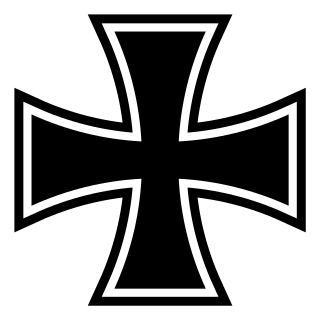
The Iron Cross is a former military decoration in the Kingdom of Prussia, and later in the German Empire (1871–1918) and Nazi Germany (1933–1945). It was established by King Frederick William III of Prussia in March 1813 backdated to the birthday of his late wife Queen Louise on 10 March 1813 during the Napoleonic Wars. Louise was the first person to receive this decoration (posthumously). The recommissioned Iron Cross was also awarded during the Franco-Prussian War, World War I, and World War II . The Iron Cross was normally a military decoration only, though there were instances of it being awarded to civilians for performing military functions. Two examples of this were civilian test pilots Hanna Reitsch who was awarded the Iron Cross 2nd Class and 1st Class and Melitta Schenk Gräfin von Stauffenberg, who was awarded the Iron Cross 2nd Class, for their actions as pilots during World War II.
After the Winter War, Onni Bovellan changed his surname to Palaste. He worked as director of the Vuokatti sports academy and also met his wife Kerttu Klemetti.

Vuokatti is a village, a forested hill range and a rail transport location in Sotkamo, Kainuu, Finland.
Onni Palaste started writing factual, but slightly dramatised novels about the Winter War in 1967. His original inspiration to writing was winning a short story competition during the war, after which his fellow soldiers suggested he try writing full-length novels. He had written about twenty war novels, the latest of which was published in 2004. He has also written a three-novel mini-series about Simo Hurtta, a Swedish tax official during the 17th-18th century Greater Wrath.

A novel is a relatively long work of narrative fiction, normally written in prose form, and which is typically published as a book.
Major Simon Affleck was a Swedish tax official, of Scottish descent, who worked in then Swedish-ruled Finland. He had been appointed by the King of Sweden to collect taxes in the Pielisjärvi region, and also paid the rent of his mansion in Pielisjärvi to the King.
Onni and Kerttu Palaste lived their elder years in Helsinki, Finland. Onni Palaste died on 1 July 2009 at the age of 91. [1] He and his wife Kerttu are survived by their four children.

Helsinki is the capital and most populous city of Finland. Located on the shore of the Gulf of Finland, it is the seat of the region of Uusimaa in southern Finland, and has a population of 650,058. The city's urban area has a population of 1,268,296, making it by far the most populous urban area in Finland as well as the country's most important center for politics, education, finance, culture, and research. Helsinki is located 80 kilometres (50 mi) north of Tallinn, Estonia, 400 km (250 mi) east of Stockholm, Sweden, and 390 km (240 mi) west of Saint Petersburg, Russia. It has close historical ties with these three cities.

